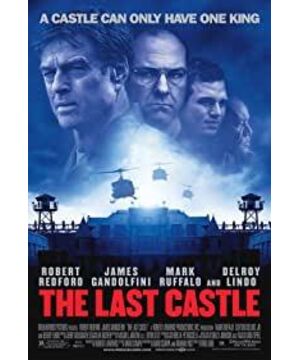Talk about a few scenarios that I am more concerned about. At the beginning of the film, the general has just been sent to prison. The warden admires the general's talent and achievements, and is a loyal fan of the general in today's vocabulary. He had a large collection of military memorabilia, and a very crucial event occurred when he hoped to get the general's book to sign. The general said to the captain standing next to him: Only people who have never experienced a real war would like to collect these things! This is a very, very crucial sentence. We can see that the warden's attitude towards the general has undergone a 180-degree complete change after hearing it. In addition, the warden asked the general what he could do, out of respect and hoped to do something to help the general, but the general replied that there was nothing to help. We can find that the form of the film has since changed to the warden's efforts to suppress the authority and influence of the general, including the punishment of salute and the demolition of the spiritual walls built by the prisoners, resulting in the manslaughter of a prisoner, which eventually led to the The general leads the prisoners to a riot and an eventual tragic ending.
The warden is set up as a villain, but the communication at the beginning is the root cause of the whole incident, and I think the general has an inescapable responsibility here. He committed several fatal problems: hurting the warden's feelings and respect for him, rejecting the other party's good intentions, and threatening the other party's authority. What he said to the captain seriously hurt the warden's self-esteem. Imagine the respect you have for someone, but how do you feel when the other person tells you that it's all rubbish? This was the turning point of the warden's attitude towards him, from admiration to hatred just because of his "unintentional" evaluation; when the warden tried to help the general, the general politely refused, in Chinese words, it was very disrespectful. I think in Western thinking, if the other party takes the initiative to show affection, even if you really don't need it, you should give the necessary response, otherwise it is very likely to be misinterpreted by the other party. Regarding the salute and punishment, even if the general is really just to boost the prisoner's mood and morale, he also needs to take into account the avoidance of suspicion. His special identity and influence would have made the warden feel that his status and authority were in danger, but whether it was the communication of the first meeting or the follow-up events, it seemed that the general never considered the warden's feelings, and in the end it seemed that Neither side realized that the tragedy could have been avoided. Imagine if the general didn't say those words when they met for the first time, and accepted the kindness of the warden kindly, he could consider the violation of the warden's interests and authority when doing things, and I believe that things would not turn so fast. The imaginary general and the warden have a harmonious relationship. Even if the warden's management is inappropriate, the general can give advice and guidance in a more appropriate way, and it is not difficult to change the prison situation.
It is precisely because of the above-mentioned plot that it is difficult to position the warden as a negative character, except that he needs to explore the concept of prison management. The series of events resulted in the unsustainable relationship between the two parties. In the film, what crime the general committed is also very vague. Except for the prison director who read the verdict in front of the prisoners in order to suppress the general's prestige, it is difficult to judge whether the general is guilty or not, so it is difficult to establish a positive general. image. The ambiguity that leads to the final outcome, seeing that at the end, there may be confusion in many people's hearts. What is all this for? It seems difficult to judge who is right and who is wrong.
I think the greatest value of the movie is to give us some hints, because most of us don't have the encounters in the movie in our lives. But it does reveal problems that everyone can encounter. Be cautious in your words and deeds, don’t offend others easily, what’s even scarier is to offend others without knowing it yourself; if others show kindness, even if you really don’t need it, give positive feedback and response, and don’t let the other party feel kindness Has been insulted; need to pay attention to the interests and rights of the people around you, not to infringe on them unconsciously. Doing so may really help you avoid a lot of unpleasantness and tragedy that shouldn't have happened. Maybe one day we humans will rebuild the glorious Tower of Babel.
View more about The Last Castle reviews











